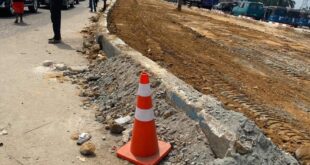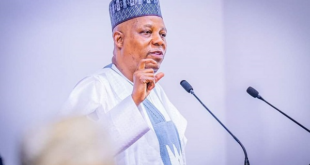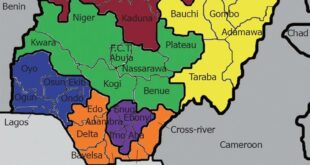By Doris Esa
President Muhammadu Buhari on Thursday, inaugurated the Large -Scale Integrated Rice Mill in Sheda, Kwali, Abuj, to enhance rice production.
Speaking at the inauguration, Buhari said the mill is aimed at expanding domestic rice production and achieving self-sufficiency in the country.
The president said that the mill in Kwali, was one of the 10 mills embarked upon by his Administration.
Buhari was represented by the Minister, Federal Ministry of Agriculture and Rural Development, Dr Mohammad Abubakar.
He said his administration had intensively promoted and supported agricultural development in the country through the Anchor Borrower Programme.
The president said other programmes are, the Fertilizer Initiative, Grain Aggregation Centres and Special Agro-industrial Processing Zone Programme.
” This is line with the Food Security’s component of this Government’s nine priorities.
“Our agricultural development strategy has enabled the increased output recorded in critical arable and cash crops,” he said.
Buhari said the accomplishment (Rice inauguration) clearly demonstrates government’s commitment to addressing critical infrastructural projects and keeping with the ideals of the change agenda.
“This is to ensure prudence in the management of public resources, value for money considering the huge investments in this project.
“We have witnessed the rapid increase in domestic rice production from the incentive given to farmers and processors over this period.
“In the agricultural sector, we indeed have capacity to be food secure if we rightly harness and deploy our human and material resources.
” An aspect of this commitment, is the establishment of 10 Large Scale Integrated Rice Processing Mills located across the North West, North East, North Central, South South and South West Zones of the country,” he said.
He said that the concept is a public private partnership between the government and the anchor investors, to increase the country’s processing capacity for rice production.
Buhari said it would also fill-up demand-supply gap and make the country self-sufficient in the commodity value chain.
He said that mechanisation and input would be sustained by successive administrations to consistently make the country food secure.
“I therefore, encourage every Nigerian to invest in any aspect of agricultural value chain, by using the available incentives, undertaking agribusiness and aiding food production in the country.
” It will demonstrate our collective stake of developing the sector and providing food for the teeming population,” he said.
The president urged all stakeholders of the mills, especially, the management to ensure efficient operations, good customer service and maintenance culture in the operations of the mill.
In a remark, Abubakar, said the project was part of the modest effort of the Government to attain food security.
He said the mill is aimed to eliminate the importation of rice that ordinarily “We have the capacity to produce locally and create employment in the Agribusiness sector”.
Abubakar was represented by Mustapha Shehuri, Minister of State, Federal Ministry of Agriculture and Rural Development.
In a Goodwill message, the Minister of Information and Culture, Alhaji Lai Mohammed, said rice is a stable food in Nigeria..
He said that the rice mill inaugurated would create employment for women and youths in the country.
Mohammed, was also represented by Dr Patricia Narai, Director, Domestic and Ecotourism, Ministry of Information and Culture.
Also, the Minister of FCT, Mohammed Bello, said the mill would contribute to the agricultural production of the country.
He said the mill represented a significant milestone in the agricultural sector, which is a key driver of Nigeria as it would meet domestic demand.
Bello was represented by Malam Abubakar Ibrahim, Secretary, Agriculture and Rural Development, FCT.
The News Agency of Nigeria (NAN) reports that the mill was part of the rice mills Buhari approved under the Public Private Partnership (PPP) model based on the “Build, Operate, and Own”.
(NAN)
Subscribe to the Advocate News letter and receive news updates daily in your inbox.
 Advocate.ng Latest news update on politics, entertainment, sport and more
Advocate.ng Latest news update on politics, entertainment, sport and more




